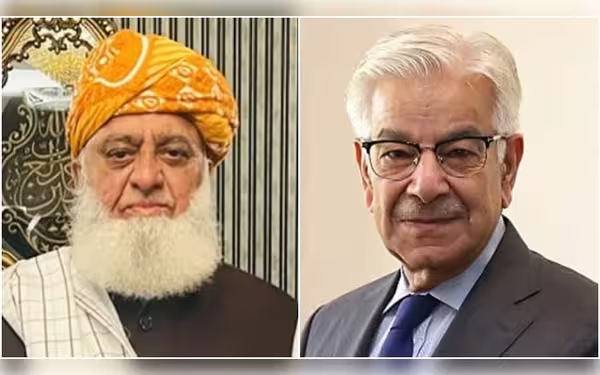Saturday, November 16, 2024 05:47 PM
Khawaja Asif Remains Hopeful for JUI-F Support on Constitutional Amendments
- Khawaja Asif optimistic about JUI-F collaboration.
- Maulana Fazl rejects constitutional amendments as controversial.
- Government faces challenges in securing parliamentary support.
 Image Credits: thenews
Image Credits: thenewsKhawaja Asif expresses hope for JUI-F support on constitutional amendments despite Maulana Fazl's rejection.
In a recent development, Defence Minister Khawaja Asif expressed optimism regarding the government's efforts to secure support from the Jamiat Ulema-e-Islam-Fazl (JUI-F) for proposed constitutional amendments. This comes despite the party's chief, Maulana Fazlur Rehman, having outright rejected the draft of the amendments, which aim to alter Pakistan's judicial and parliamentary systems. Asif described Fazl as "a shrewd politician" during his appearance on the Geo News program, Capital Talk, indicating that he believes there is still a chance for collaboration.
The proposed amendments include significant changes, such as the potential extension of the tenure of Chief Justice of Pakistan Qazi Faez Isa and adjustments to judges' retirement age. These changes have become a contentious issue for the ruling coalition, which currently lacks a two-thirds majority in parliament to pass the legislation. Asif emphasized that the Pakistan Muslim League-Nawaz (PML-N) is making tireless efforts to navigate this legislative challenge, stating that the government allies are "on the same page" and are engaging in daily discussions with Pakistan Peoples Party Chairman Bilawal Bhutto-Zardari.
Reflecting on the past, Asif noted that the paths of the ruling coalition and Maulana Fazl are not so different, recalling their shared experiences during the Pakistan Democratic Movement (PDM) that successfully removed former Prime Minister Imran Khan from office in 2022. He expressed hope that the government would address the concerns raised by the JUI-F chief in the near future, stating, "We would definitely find a resolution." Asif also framed the constitutional changes as part of the "Charter of Democracy" established between the PML-N and the PPP, which he claimed was also endorsed by Imran Khan in 2006.
As the ruling coalition continues to seek support from Fazl, they have held numerous meetings with him, but these efforts have yet to yield positive results. Earlier in the day, Fazl firmly rejected the proposed constitutional package, labeling it as "controversial" and asserting that accepting such changes would represent a significant breach of the nation's trust. The JUI-F leader's strong stance comes amid the government's acknowledgment that the amendments have been "postponed indefinitely" due to the lack of consensus.
Currently, the government is short of 13 votes in the National Assembly and nine in the Senate to pass the constitutional amendments. The situation highlights the complexities of Pakistan's political landscape, where alliances and opposition can shift rapidly. As the government navigates these challenges, the outcome of the proposed amendments remains uncertain, leaving many to wonder how this will impact the future of Pakistan's judicial and parliamentary systems.
The ongoing discussions surrounding the constitutional amendments reflect the intricate dynamics of Pakistani politics. While the government remains hopeful for support from JUI-F, the firm rejection by Maulana Fazl underscores the challenges ahead. As the political landscape continues to evolve, it is crucial for all parties involved to prioritize the nation's interests and work towards a consensus that upholds the democratic values of Pakistan.













